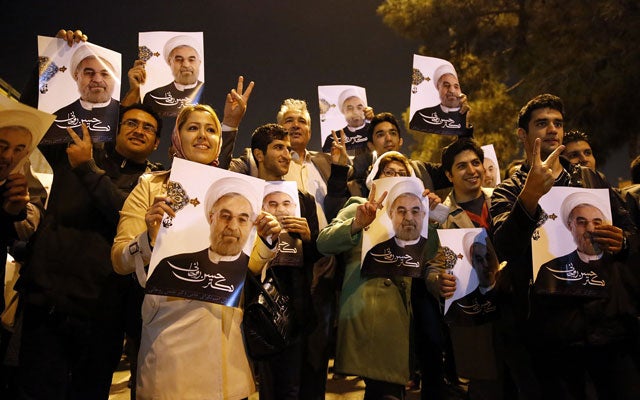Q&A on the Iran Nuclear Deal
James Phillips /

Iranians flash the victory sign to celebrate their government’s new nuclear deal. (Photo: ARASH KHAMOOSHI/AFP/Getty Images/Newscom)
James Phillips, Heritage’s Senior Research Fellow for Middle Eastern Affairs, gives us his take on the latest deal with Iran.
Will the interim agreement stop Iran’s nuclear weapons program?
The agreement will marginally slow, but not halt, Iran’s nuclear efforts. It has been incorrectly described as a “freeze,” but many elements of Iran’s nuclear program will continue. Iran is allowed to enrich uranium, despite the fact that this explicitly violates U.N. Security Council resolutions. Tehran pledged to halt uranium enrichment above the 5 percent level appropriate for power reactors.
But the agreement does nothing to reduce Iran’s stockpile of low enriched uranium, ostensibly meant for its nuclear power reactor at Bushehr, despite the fact that reactor will be fueled by the Russians for at least 10 years anyway.
What is wrong with using this agreement as a first step?
This is a flawed deal that risks reducing sanctions pressure on Iran over the next six months in return for easily reversible Iranian pledges, some of which Iran has given before but subsequently reneged on. The nuclear deal requires Iran to curb some, but not all, of its nuclear activities in return for about $7 billion in sanctions relief over six months. The problem is that easing sanctions will make the final step harder. To force Tehran to make the necessary deeper concessions in a final deal, more sanctions are required. But the deal commits the Administration to refrain from imposing more sanctions over the next six months.
The agreement also implicitly recognizes Iran’s claim that it has a “right” to enrichment by stipulating that the final agreement will “involve a mutually defined enrichment program.” This abandons the demand for a suspension of enrichment mandated by multiple U.N. Security Council resolutions. The agreement also does not address weaponization research and development or Iran’s ballistic missile program, which will continue to advance.
What do other countries in the region think?
Key U.S. allies, especially Israel and Saudi Arabia, publicly complained about the Administration’s negotiating approach before the interim deal was reached. After the deal was announced on Saturday, Israeli Prime Minister Benjamin Netanyahu denounced the deal as a “historic mistake” and warned that Israel “has the right and duty to defend itself by itself.”
This is a signal that Israel could take preventive action to protect itself against Iran’s nuclear threat in the future. Saudi Arabia and Arab oil kingdoms remain worried that the deal will not end Iran’s nuclear ambitions but will leave them more vulnerable to Iranian coercion, especially if the Obama Administration disengages from the Middle East and actually does “pivot” to Asia. Those fears may lead the Saudis and other states threatened by Iran to seek their own nuclear capabilities, which will make the volatile Middle East even more dangerous.
What does the agreement actually accomplish?
The deal temporarily bars Iranian uranium enrichment beyond the 5 percent threshold and requires Iran to reduce its stockpile of 20 percent enriched uranium by converting it into forms that will be more difficult to further enrich, accept more intrusive inspections of its nuclear facilities, and freeze work on the Arak heavy water reactor, which will give Iran an alternative plutonium route to a nuclear weapon if it becomes operational.
These are steps in the right direction that can help limit the speed of Iran’s progress on nuclear weapons, but they do not go far enough, and they are easily reversible. All of the most difficult questions are postponed until the final stage of negotiations.
What happens next?
Iran and the P5 + 1 (the five permanent members of the U.N. Security Council plus Germany) will begin grueling negotiations on a comprehensive agreement that is supposed to be finished within six months. This deadline is unlikely to be met. Iran is determined to preserve its nuclear option and is likely to reject the hard concessions necessary to bar that option.
Iranian President Hassan Rouhani has already declared that the deal has recognized Iran’s “right” to uranium enrichment. This sets the stage for Iran to back out of the deal if pressed hard in the future, claiming that the West reneged on its commitments. As in previous negotiations with Iran, the interim agreement may eventually prove to be a diplomatic dead end.
